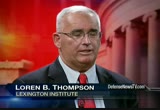tv This Week in Defense CBS November 11, 2012 8:00am-8:30am EST
8:00 am
. >> welcome to "this week in defense news" president obama will romaine the commander in chief for another four years, but before he's sworn in again in january, he has to work with the republican house, and the democratic senate to avert the threat of sequestration. absent a deficit reduction deal by the end of the year, more than $1 trillion in cuts would be triggered across the government, half would hit the pentagon that's just starting to implement $500 billion in cuts over the coming decade. here to talk about sequestration, new players in congress and the administration is our expert roundtable with rick maze, the editor of the military times up in, macker
8:01 am
mackenzie eagin, and gordon adams who served in the clinton white house. guys, welcome back, and thanks for joining us. mackenzie, let's start with you, we have the sam problems, occasion of characters, president obama in the debate was adamant that sequestration wouldn't happen. can he strike a deal this time? and having seriously committed themselves to stymying the agenda, the day after being elected the nice time. is the republican leadership going to play ball with him this time? >> there's no doubt the president is in the driver's seat, and he hold the cards and leverage, and conservatives don't have much from which they can negotiate. i don't know if the speaker of the house has the vote to give the president what he wants, which is tax increases on high income earners, but they will have to take the vote to show one way or the other. i think there is some sort of patchy deal put together at the last minute. i think house republicans can
8:02 am
work with the president. but on other issues going forward, if the white house shows leadership, they've been disengaged on this issue until now, so it will be a welcomed change to see the white house get involved. >> it seems the way the republican base is narrowed, they don't have that much left besides the resistance to tax cuts in terms of securing that base. so if they were to yield on that one core issue, they would be an even more trouble than they are this week. and if they don't yield, then i don't know where the agreement comes that couldn't have been obtained early earlier. >> the hoist house -- the house is firm on no increase, and are being pushed by the tea party faction, the votes that believe that the gop failed them, the gop leadership failed them in losing this election. and so they don't want any tax increases, so it doesn't give a
8:03 am
lot of maneuvering room and the democratic leader in the senate has said, -- you wonder if you're going to have an agreement, what on earth will the agreement be? and when will you start it? it doesn't look like they're not even going to start talking about an agreement until december. you just wonder, what kind of grand bargain can you get in at short period of time? >> i think you're going to get sausage, which is what you get, because does the congress make sausage, but they talk to the white house. >> there's a lot of thing we can't look at and see. >> and what's unique about this moment in history, mackenzie is right, the president has leverage, you can put a lot of things on the table, and there are things to put on the table. it's the perfect recipe for let's make a deal, and i don't think it's a question they don't have time to come up with a package. what needs to be doning my god, we have -- done, my god, we have recipes all over the group. they are, we know the answers.
8:04 am
>> you have been active writing about it as well. >> this is not like this is rocket science. it's political will, it's not a question of what's the deal. but there will be a deal, i predict, that probably will look like sausage, that may defer things, and it won't be long term, but will move it. >> if you look, the last time around, canton and biden truck a deal in -- struck a deal in like four hours. and they thought my god, we made progress so quickly, let's go back to the caucus and make it look more difficult, and it unraveled from there. so if you want to get to the core, and you said even on taxes, there's going to be a little of flexibility, everybody acknowledging taxes go up at a certain point. isn't that the way you death it done? you strike a compact, say we will do middle class tax cuts, and may extend portions of the rich tax cuts, but you get rid of it for high income earners, or have it go away entirely.
8:05 am
>> taxes go up if you do nothing, revenues go up because of the way the provisions expire at the end of the year. if you're a republican, and you've just lost most of the election, why are you going to volunteer tax cuts when you know the taxes are going to go up automatically? there's no political sense. >> my position has been this thing happens, triggers, you get so the defense cuts. the taxes go away. >> i think it's possible that sequestration does happen. i don't think that's the worst of all possible worlds. we've been treated to this shadow play for the last 18 months but how horrible dooms day is going to happen. there's a lot of tools the pentagon can use to delay the impact of sequestration, the impact cannot be felt right away, but moved later in the year. sequestration is not a doomsday machine, it's just a tool that could go into it.
8:06 am
>> the agreement that needs to be taking shape among bipartisan senators in the senate, this is just a senate deal, would be to avoid defense related cuts with some temporary measure to put that off until next year, and do something with taxes so it's like a mini little agreement just to get them through the inauguration and into next year so they can start doing something. i think the defense will be spared anything, if sequestration doesn't happen, and maybe let the bush tax cuts occur. >> i'm going to have to defer to rick in some way, but i don't think defense isn't the least spared, mom in the long run. >> -- not in the long run. >> what it means, it will go down to the wire, and it's going to be a deal that probably pleases no one, no side is going to think this was a good deal. >> perfect compromise! >> everybody walks away somewhat angry. let's look at some players, secretary panetta made it clear he will see it through this,
8:07 am
sort of that one year or so he served. there is talk that secretary clinton's going to hang it up, and it's been remarkable how many people have stayed in the administration, traditionally, you would have found more people leaveing, but there's going to be a lot the turn over. on the hill, jill nelson is leaving, joe lieberman, todd akin who lost his race who will be leaving, roscoe bartlett who is going to be leaving. norm dixon and others. what the environment we look into congestionly? who will replace whom? and who will we see on the administration. >> i think the most important change on the hill in terms of the defense committee is that there were people from the vietnam generation who were like giants, people who could really move the chamber, like jack murtha, other victim, even john mccain who is timing out on the senate arms services committee.
8:08 am
they are gradually being traded away, and replaced by people who may feel as strongly, but not as vocal and not as forceful. >> not as powerful either, and so they are not the deal-makers in either chamber. they can't bring along votes, even jon kyl could do that on strategic forces issues, and treat at thes and other things, so you're seeing these committees populated with so many green members, so little depth of the issues and knowledge and history, and so what you'll probably see is, again, the executive branch is going to be the boss and the congress is going to continue to roll over. >> so the willingness among the new people to reach a compromise, they've never been in an era where you have to compromise and that's what is missions. randy forbes is probably the happiest guy. he will become the sea power chairman. a great job. >> specially from the tide water.
8:10 am
>> we're back with our roundtable, and i want to pick up the conversation where we are on the leadership positions and who will take what on capitol hill. who will be, you mentioned randy forbes moving to sea power, which would be good for a guy from the tide water. who are some other guys, who will replace bartlett should. >> probably thorn including berry, who has been in the back water, a good place for him. >> and he's well respected. >> well respected.
8:11 am
>> and awfully nonpartisan in the congress that's becoming -- >> and the republican is the loser, walter jones, because -- of his opposition to the war in afghanistan, he will never get a job even though he's second ranking. >> and the senator from michigan, i was there was some not that mow ran might get it, but it looks like he he won't contest that. >> but we need to set this in the context, this was not an election about defense. and right now, defense is not the core issue that is on people's minds. the issue is one we talked about is where is the economy going, where is the budget i don't go? all the -- going? all the shifts will be impacted by what the leadership is going to do in cutting the bigger deals. you can have expectations about
8:12 am
particular members what they do in a subcommittee, but in my view, the budget is going downward, because of being restricted by the -- >> i agree in principal on that, but what people are opposed to or in favor of in terms of reconciling ways and meanings, more people are opposed to defense cuts than limiting the mortgage interest rate deduction or cutting healthcare benefits. >> if you look at the issues on people's minds, and what's important to them, salience sir puppet the defense and foreign policy at the bottom. >> in term of leadership jobs, who reaces mccain. >> jim who have from oklahoma will move up. it is expected he will get the nod. >> on how will he lead differently? >> he cares about different issues. senator mccain has been focused on acquisition reform,
8:13 am
better or worse, contractors -- and the role of contractors and manufacturers and the defense acquisition process, weapons manufacturing in particular. he sided with president obama on a lot of his defense cuts and proposals in the acquisition in r&d modernization, so he comes in more sympathetic, to the department and services, he's a ground focus member, which is a welcomed change. >> and interesting timing on that change, seeing how the air force and navy are moving up -- >> and one of the things, mccain was more likely to try to reform pay compensation and benefits than inhof, and they will have to depend on staff to help him, where mccain was talking about much let's reform, let's cut. >> the reform question, everybody on this panel has
8:14 am
talked about the fact nobody wanted to hit the third rail issues of papers and benefits reform and retirement reform, or promotion reform. and a number of, almost everybody here has written how important it is to reform that enterprise. late go to the question of -- let's go to the question there will likely be more cuts, downside on defense budget. are we at a point where guys are tackle the hard issues which is -- >> no. no. when you have a political -- >> come on! give me a little hope, guys! come on. >> if you look at the popular vote for president, this is a fairly evenly divided political system, and that will just alienate voters, nobody will vote with you because you cut military benefits, but many will vote against you. >> it's structured so it's all pain and no gain. you could touch this third rail and make it less, you know, painful, if you start to bring in other -- you grow some
8:15 am
benefits while you take others away or change them, and you grandfather everybody in. it's like how we're going to have to deal -- >> you guys, in a bigger set of choices, when the budget comes down, there are four places that could look to do it. one is to draw down the forces, and they will. two is to stretch and cut the buy of major systems and hammer the dickens out of miner procurement, three is what you do about the huge guess back office, which is the overhead at the department of defense and operations and maintenance, and civilian personnel will pay the price. some trimming attrition, maybe buy outs on the civil indian side as it -- civilian side comes down. the personnel is the last piece you'll get to. >> mile make you feel better. i think they will try to do something, i don't think it will happen right away, as long as you have troops in combat, in afghanistan, it is death to any
8:16 am
politician that recommends capping pay or making them pay more for benefits, but if you talk 20 billion cuts, that is part of any deficit agreement, you have no choice but to make fundamental changes over time, and like mackenzie said, you can save money if you grandfather it in. like les managed to cut retire pay. >> you will see people sell this story on capitol hill. >> the problem is, we've had the answers -- i have review comes up with the same options, we know what they are. >> the joint chiefs can sell it. >> coming me and the guys walked into this place. you woulda thought from the name of it, it was gonna be packed with sailors. so i immediately picked out the biggest guy in there. and i walked straight up to him.
8:17 am
now he looks me square in the eye, and, i swear he says, "welcome to navy federal credit union." ha! whoa friendly alert! i got a great auto rate outta that guy. you know now i have a wonderful hybrid. slate blue. creme interior. he was so nice! 4 million members. 4 million stories. navy federal credit union.
8:19 am
>> welcome back, we're here with rick maze and the military times up in, loren thompson, mackenzie eagin of the american enterprise institute, and gordon adam of american university and simpson center. let's go to the important issue, which is who takes which jobs at the pentagon. loren? panetta moves on who will we see, sometimes chuck hadelea's name. >> he's a member of the
8:20 am
opposition party, but not a problematic one. i don't think they will do that. i think they will be with ash carter, the default. he knows everything about the building at the point. >> and has a great policy foundation which is what he had before he took over. >> here's the key. the chief is whoever the next secretary of defense is, they will be build-down. you want somebody who notes the in in other words of the building, -- inside of the building, and work with the white house, the white house is really -- >> the deputy will be key, who are we hearing? >> flornoi is regarded as a policy player, but that requires a manager who should be looking for somebody with some management credential. let's go to the issue of uncertainty. there are a lot of folks who have been saying defense court terse have been sitting -- contractors have been sitting on the inside. does it clear up the
8:21 am
uncertainty? >> i don't think it does. part of the problem with the urn certainty wasn't just the resolution of the open election, but lack of -- of the election, but the lack of confidence, you'll see that continue as people receive the status quo as more gridlock. the solution will probably be patchy and shoddy, and not well done, it might have patchwork fixes, but it won't be a good one, so that in theory leaves the cloud of uncertainty. >> they noah the budget is going down, procurement goes down harder than the rest, and the last two years, companies have been dealing with that. >> and defense leaders have been saying what they want to protect. >> people should feel better after april 1 when they have to handle the debt ceiling and they have to handle everything, and we'll have some vision. >> but afghanistan? rick, it looks like it wasn't an issue in the campaign --
8:22 am
barely mentioned in the campaign. >> you hope there are no headlines in 2013, the kind of headlines would be something has gone terribly wrong, and i think you almost can see the tension building. >> afghanistan is like another third rail, nobody really wanted to touch it on the campaign trail, because the whole country want to be out of there so much. >> we have a little time left. what i want to go to is this question i've seen where the parties almost have had a complete role reversal in national security. republicans have built that as being an area of expertise, democrats are week on national security -- weak on the national security, and the number of security experts that are saying my god, it's the democrats that are the responsible party, how do you field that? is there truth to that? >> i think that's accurate. i think that republicans gave it
8:23 am
away willingly. this was a proactive attempt. you hear some members say let's bring back the party of reagan. that party doesn't list or things they support, it's gone, and that's why you've seen, again, the executive branch running the table on their defense priorities whatever they may be. >> russia is a boogey man? that's like 20 years ago. it's not the place they need to be. they are trying to make a stand. >> and the war on terrorism has lost the political legs, so what it is you're going to use to beat the american people over the head on national security is very different now so the approach that the obama administration has been taking which is actually a workable approach when the world has changed as much as it is. >> and -- >> obama has done a great job on national security, the republican predecessor did such a bad job. that's a hard thing for the republicans to live it. >> and it's reflected in the
8:24 am
8:26 am
must become the top priority. defense and non-defense accounts will take a 10% hit. threatening to tip an improving but still fragile economy back into recession. president obama's already exempted military manpower from cut, so act convictions services and packs will be hit harder -- fortunately, there's bright -- broad agreement that should be avoided. congress and the white house famed to craft the crow mice. republicans were stonewalling the president to push him from office to strike a deal with their own. it didn't work, now we have the same president, roughly the same congress and same approximate. obama has pledged to reach across party line to strike a bargain. the deem must include prude cuts, raising the debt ceiling, and revenue increases. but, failure to make a deem especially on debt and borrowing will rattle financial markets
8:27 am
and credit rating agencies with potentially devastating consequences for the economy, that underwrite u.s. national security. thanks for joining us. i'm vago muradian, you can watch this program online at defensenewstv.com or e-mail me, and a reminder to thank the men and women who are or have served the nation in uniform for their hard work and sacrifice. i'll be back next week at the same time, until then, have a great week.
8:29 am
after a fierce race to the finish as anything changed? as the president and congress stare over the fiscal cliff, what do the collections marine for -- elections mean for biotech researchers and patients? i'm steve usdin, welcome to "biocentury this week". elections are over but politics isn't. congress returns this week and the fiscal cliff clock is ticking. failure to act by the end of december could trigger deep spending cuts including $2.6 billion from nih. president obama's re-election means the affordable care act will go effect but implementation especially pressure to cut the deficit will be challenging. president obama had this to say about the hurdles and priorities in his
219 Views
IN COLLECTIONS
WUSA (CBS) Television Archive
Television Archive  Television Archive News Search Service
Television Archive News Search Service 
Uploaded by TV Archive on

 Live Music Archive
Live Music Archive Librivox Free Audio
Librivox Free Audio Metropolitan Museum
Metropolitan Museum Cleveland Museum of Art
Cleveland Museum of Art Internet Arcade
Internet Arcade Console Living Room
Console Living Room Books to Borrow
Books to Borrow Open Library
Open Library TV News
TV News Understanding 9/11
Understanding 9/11




























